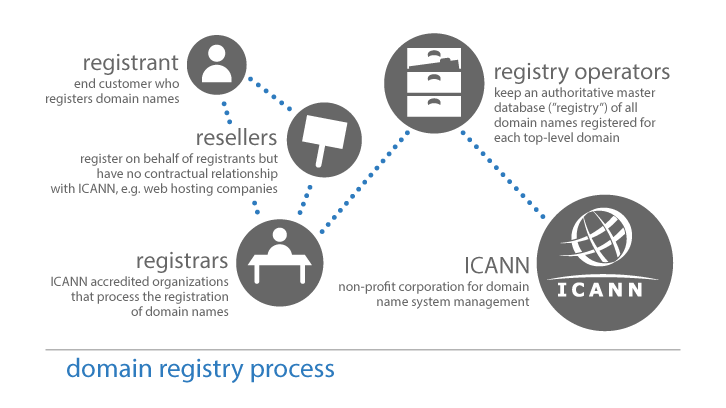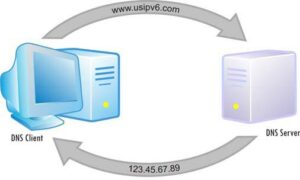Domain registration information is maintained by the domain name registries, which contract with domain registrars to provide registration services to the public.
An end user selects a registrar to provide the registration service, and that registrar becomes the designated registrar for the domain chosen by the user.
Only the designated registrar may modify or delete information about domain names in a central registry database. It is not unusual for an end user to switch registrars, invoking a domain transfer process between the registrars involved, that is governed by specific domain name transfer policies.
When a registrar registers a com domain name for an end-user, it must pay a maximum annual fee of US$7.85 to VeriSign, the registry operator for com, and a US$0.18 annual administration fee to ICANN. Most domain registrars price their services and products to address both the annual fees and the administration fees that must be paid to ICANN.
Barriers to entry into the bulk registrar industry are high for new companies without an existing customer base.
A domain name registrant is the person or organization who has registered the domain name. In order to do so, the domain name registrant will usually apply online to a domain registrar or one of their resellers. The domain name registrant is bound by the terms and conditions of the registrar with which it registers its domain name, for instance adhering to a certain code of conduct or indemnifying the registrar and registry against any legal or civil action taken as a result of use of the domain name.
Domain name registrants have certain responsibilities that are incorporated into these terms and conditions like payment of registration fees and submission and timely update of accurate data.
In addition to registering the domain name, domain name registrants also need to have their domain names listed on name servers in order for that domain name to be reachable on the Internet. A domain name registrant is responsible for procuring or hosting his or her own name server if the registrar does not offer this service or he or she has opted out of the registrar’s service.
In some cases, a person or organization who does not wish to have their information listed in WHOIS may contract with a proxy service provider to register domain names on their behalf. In this case, the service provider is the domain name registrant, not the end customer.
Registrars are organizations accredited by ICANN and certified by the registries to sell domain names. They are bound by the Registrar Accreditation Agreement (RAA) with ICANN, and by their agreements with the registries. The RAA sets out responsibilities for the registrar including maintenance of WHOIS data, submission of data to registries, facilitating public WHOIS queries, ensuring domain name registrants details are escrowed, and complying with RAA conditions relating to the conclusion of the domain name registration period.
Some domain name registrants may opt to register through a reseller. These organizations are affiliated or under contract with registrars, and usually offer other services such as web hosting, email mailboxes etc.
Resellers are bound by their agreements with the registrar(s) whose services they sell; they are not accredited by ICANN. However, the registrar for whom they are re-selling will still be the sponsor for the domain name registration and accountable for the domain names sold by the reseller.
While registrars are contracted to conduct the day-to-day business of selling domain name registrations, registries are responsible for maintaining the registry for each TLD.
The responsibilities of the registries include accepting registration requests (whether from registrars or directly from domain name registrants), maintaining a database of the necessary domain name registration data and providing name servers to publish the zone file data (i.e. information about the location of a domain name) throughout the Internet.

The Internet Corporation for Assigned Names and Numbers (ICANN) is the non-profit organization that oversees the assignment of both IP addresses and domain names. It has responsibility for managing root server and TLD name system management and has contractual agreements with both registries and registrars that provide the foundation for the WHOIS system.
Many registrars also offer registration through reseller affiliates. An end-user registers either directly with a registrar, or indirectly through one or more layers of resellers. As of 2010, the retail cost generally ranges from a low of about $7.50 per year to about $35 per year for a simple domain registration, although registrars often drop the price far lower – sometimes even free – when ordered with other products such as web hosting services.
The maximum period of registration for a domain name is 10 years. Some registrars offer longer periods of up to 100 years, but such offers involve the registrar renewing the registration for their customer; the 100-year registration would not be in the official registration database.
To put it simply a domain name registrar is a service that lets you register and purchase domain names. Domain name registrars have been accredited by ICANN (Internet Corporation for Assigned Names and Numbers), which is a non-profit who has been delegated the responsibility to manage the Domain Name System.
Without the domain name system all we would have is confusing and hard-to-remember IP addresses, instead of the easy to use and remember domain names we have today.
For example, let’s say you’re planning on selling custom Google Pixel cases and you want to build a site around that. You’d head over to a domain name registrar and register the domain name “custompixelcases.com”. Of course, you could only register this domain name if it is still available.
During this time you’d also choose the top-level-domain for your URL. This are the extensions like.com, .org, .co, .io, etc., that follows your custom domain name.
Most domain name registrars today make it dead simple to purchase and renew your domain names, still you need to choose wisely, as each register has their associated positives and negatives. Below we’ll show you what you need to look out for when choosing the right domain name registrar for you.







